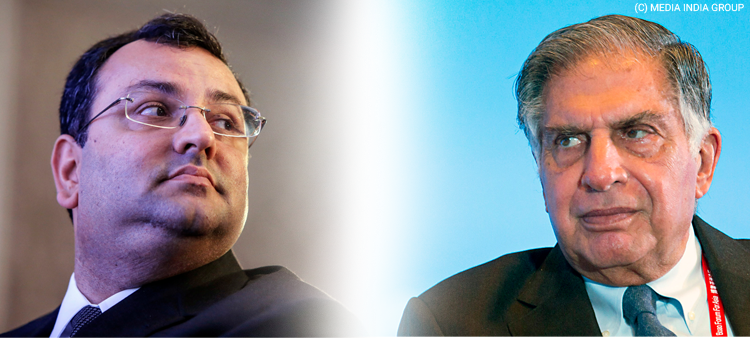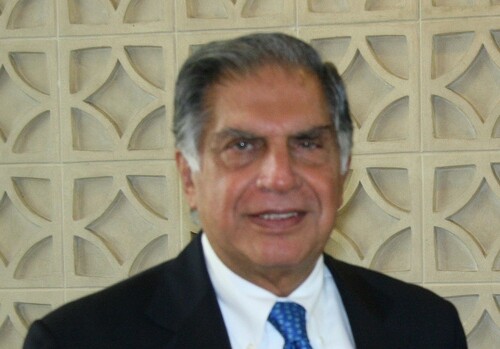Tata Sons sacks Cyrus Mistry, Ratan Tata at the helm
Biz@India

Cyrus Mistry (left) and Ratan Tata
After the board of Tata Sons Ltd replaced Cyrus Mistry as the chairman of the Tata Group on Monday, with his emblematic predecessor Ratan Tata, as an interim chairman, key questions are raised about the future of the multinational group ; from its governance to its strategy and from its financial performances to its family structure.
Why such an express removal of Mistry?
The abrupt removal of Cyrus Mistry as chairman of Tata Group, that has a yearly revenue of over USD 100 billion, created a shock in the corporate circle of India. Less than four years after having been designated as Ratan Tata’s successor, the 48-year old Irish-Indian Mistry was replaced by the charismatic Ratan Tata, 78, as interim chairman.
The reasons behind this move were not officially explained.
“The board in its collective wisdom and on the recommendations of the principal shareholders took a decision to ask him to go. The board decided that it may be appropriate to consider a change for the long-term interest of Tata Sons and the Tata Group,” a group spokesperson said.
The fact is that Cyrus Mistry, who was earlier at the helm of the Shapoorji Pallonji Group’s construction business, was struggling to better the conglomerate’s financial results as a whole. The other reason for his dismissal might be, according to inside sources quoted in the Indian media, his strategic moves and vision being questioned by the Tata family and by Ratan Tata himself, who had previously been heading the group successfully for two decades till 2012.
As an example, in June, Mistry decided the EUR 1.3 billion acquisition of Welspun’s solar farms by Tata Power, without seeking full approval of Ratan Tata and the shareholders. Such a process does not fit in the family group decision making tradition and in its power balance.
The family structure Tata Trusts is the principal shareholder of Tata Sons with a 66 pc stake. But, Mistry is not a perfect stranger either, hence the surprise after this quick sacking. Mistry is the scion of the Shapoorji Pallonji Group, which has 18.4 pc stake in Tata Sons, and a long history with the group.
Will Tata face a period of management uncertainty?
Tata Sons has created a selection committee that was given four months to choose a new chairman. The committee comprises heavyweight members: Ratan Tata himself, Venu Srinivasan, Ronen Sen, Lord Kumar Bhattacharyya and Amit Chandra.
A Tata spokesperson said, “There is no change at the level of CEOs of the Tata Group of companies.” However, the coming months could be bumpy ones for the group, in terms of management uncertainty.
Not to mention the fact that Mistry, a graduate in civil engineering from Imperial College of London and a business management graduate from the London Business School, could well challenge his sacking in Bombay High Court, arguing for instance that there should have been a 15-day notice, and paving way for a legal battle that would harm Tata Group’s image of good governance.
Is Tata Group underperforming?
Many of Tata Group divisions have been facing problems and are underperforming. Tata Steel is struggling. Tata has been trying to turn around or sell its key UK steel business, Corus Group, bought for a whopping EUR 11.8 billion in 2007 under Ratan Tata, before a sharp downward cycle in the commodity’s markets.
In the telecoms, Tata Teleservices is still facing the potential legal consequences of a bitter divorce with Japanese giant NTT DoCoMo. Tata Motors, which owns the famous brands Jaguar and Land Rover, is not in its best shape, as its Nano was never a frank success and as it has to revamp its offer to be a more effective player on a promising Indian market where competitors like Maruti, Mahindra and even the French player, Renault, are doing much better.
Even Tata Consultancy Services, traditionally the group’s big cash cow, is underperforming in a more and more competitive world market of IT services.
How such a family conglomerate should be run?
In this difficult context, a laggard world economy is also surely a disadvantage for a group whose activity outside India amount for almost 70 pc of the total revenue generation. Cyrus Mistry tried to address these issues and pushed hard for every division of Tata Group to be run as independent profit centres which have to deliver rapidly.
But, his strategic choices had still to be validated by the family patriarch, Ratan Tata.
It is not easy to be the successor of such a legend, under whose 21-year old tenure, from 1991 to 2012, Tata Group revenue grew 40 times and its profits 50 times. You inherit a tremendous pressure to do equally well and at the same time the consequences of some of the previous controversial decisions such as the buying of Corus or the Nano car launch.
Ultimately, India, famous for its family conglomerates like Tata, Reliance and Birla Group, has to deal with an old issue in worldwide business history – how to run a family conglomerate on the long run. Tata Group, founded in 1868, is symbolic in this matter for its longevity and the ability of the family to make it grow and retain not only its capitalistic control but also the managerial one. It is to be seen how the organisation manoeuvres the choppy waters now.










